Key takeaways:
- Stage fright is a common experience for performers, often driven by fear of judgment or failure, but acknowledging these feelings can transform anxiety into positive energy.
- Overcoming stage fright enables authentic self-expression and opens up greater opportunities in one’s musical career, leading to personal growth and resilience.
- Techniques such as visualization, deep breathing, and fostering connections with bandmates can effectively manage stage fright and enhance performance confidence.
- Building confidence through practice, community support, and focusing on audience connection can help shift perspective from self-doubt to a shared experience, making performances more enjoyable.
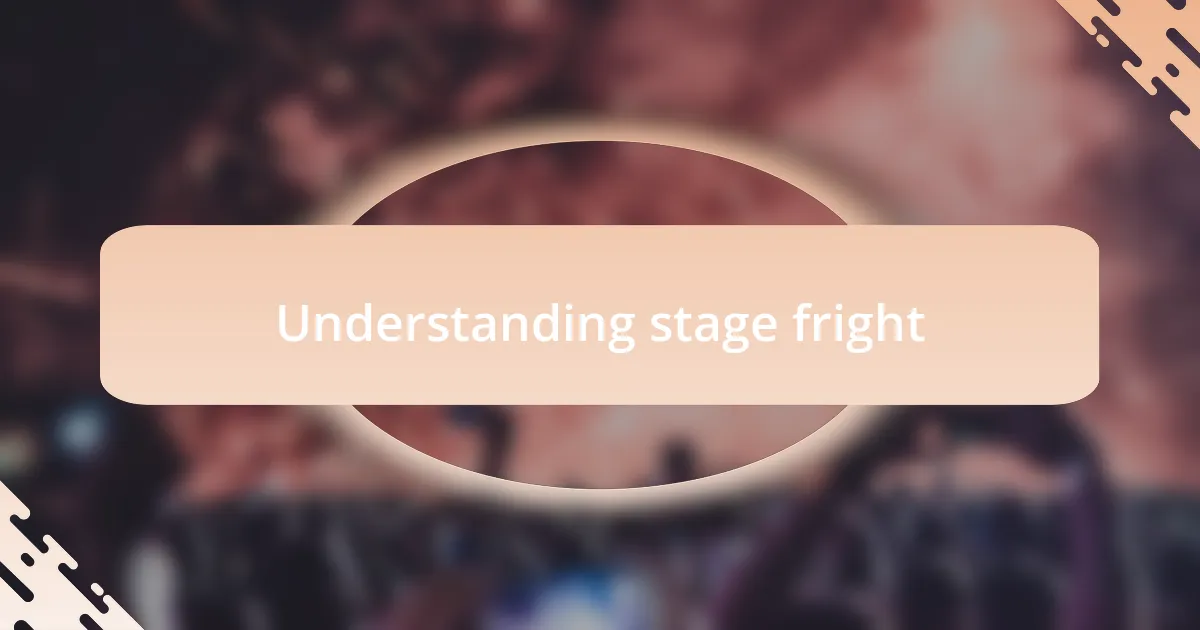
Understanding stage fright
Stage fright is more common than many people realize, and it can feel like a wave of anxiety crashing over you just before you step on stage. I remember one of my first gigs, my palms were sweaty, and I could hardly hear the music over my racing heart. Why does that happen? It’s our body’s natural response to perceived danger, often triggered by the fear of judgment or failure.
The emotions tied to stage fright can be intense. I often felt a mixture of excitement and dread, as if performing was both a passion and a burden. Have you ever experienced that electric thrill when the lights come on, only to be followed by a paralyzing fear? What I learned over time is that acknowledging these feelings is the first step in transforming that fear into energy that can enhance your performance.
Understanding stage fright involves recognizing that you’re not alone in this struggle. Every artist, at some point, grapples with self-doubt before an audience. I found comfort in knowing that even the legends experienced jitters. This knowledge can be empowering—if they can face their fears, perhaps I, too, can conquer my own and transform that anxiety into something beautiful.
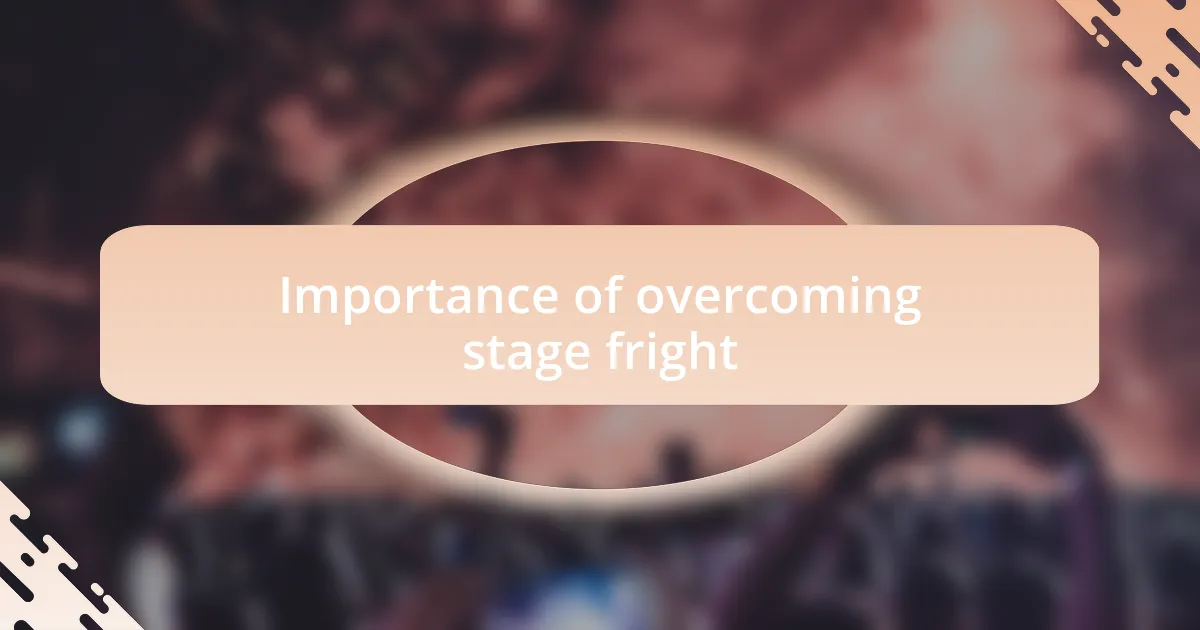
Importance of overcoming stage fright
Overcoming stage fright is crucial because it allows you to express your true self on stage. I remember a performance where I finally managed to suppress the nerves instead of letting them control me. That night, I was able to connect with the audience in a way I had never experienced before, and it made every note resonate with authenticity.
When you conquer stage fright, you open doors to greater opportunities in your musical career. In my experience, the more I performed without fear, the more invitations I received to collaborate and play at various venues. Each gig became a chance to share my passion for music, and I found that the joy of performing overshadowed any residual anxiety I once felt.
Embracing the challenge of stage fright can lead to personal growth beyond music. It pushes you to face discomfort head-on and helps you build resilience. With every performance, I learned not just about my craft but also about who I am and what I’m capable of achieving under pressure. Have you ever pushed through a fear and emerged stronger on the other side? Imagine how liberating that experience can be.
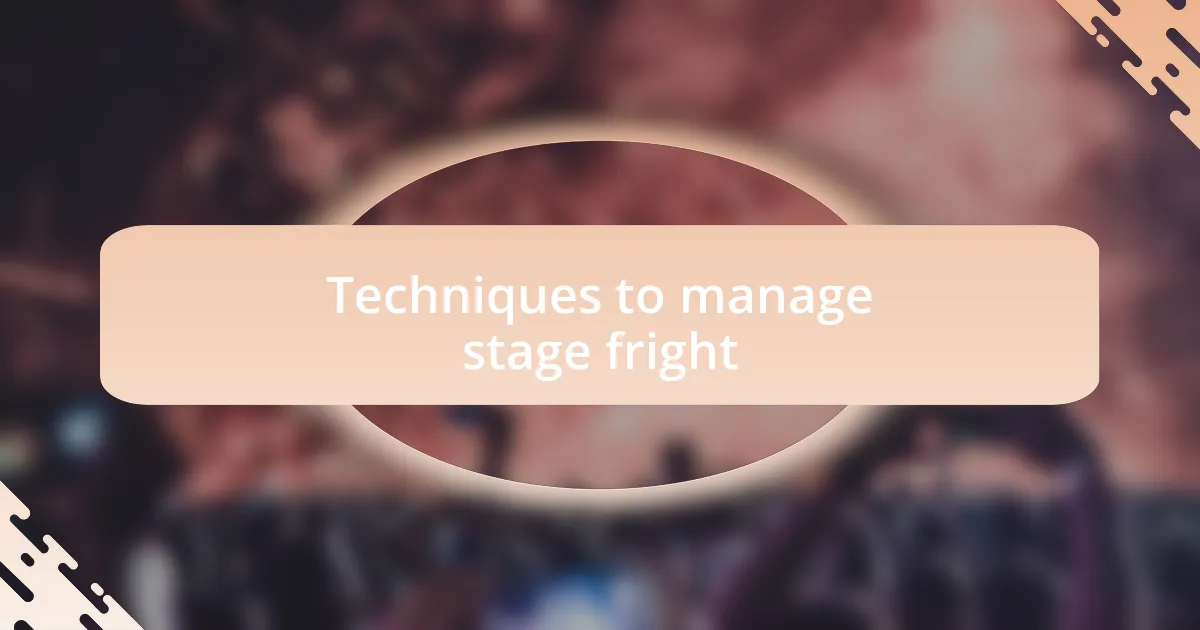
Techniques to manage stage fright
One technique that I found really helpful was visualization. Before stepping on stage, I would close my eyes and picture myself performing confidently, even imagining the applause from the audience. This mental rehearsal not only calmed my nerves but also helped me to embrace the excitement of the upcoming performance—almost like conjuring up a magic spell to enhance my confidence.
Another approach I adopted was deep breathing exercises. It might sound simple, but when I consciously focused on my breath, I could feel my heart rate slowing down, and the tension in my body easing. During one particular performance, I took a moment before going on stage, inhaling deeply and exhaling slowly, which truly grounded me. This technique reminded me that I had control over my body and emotions, even in a situation that felt so overwhelming.
Finally, connecting with my bandmates always made a huge difference. Right before we went on stage, I would glance at them and share reassuring smiles or a quick joke. Those moments of camaraderie not only lifted my spirits but also created a sense of shared energy. Have you ever felt that buzz when you’re surrounded by friends before a big moment? It’s that connection that transformed my fear into an electric thrill, reminding me that I wasn’t alone up there.
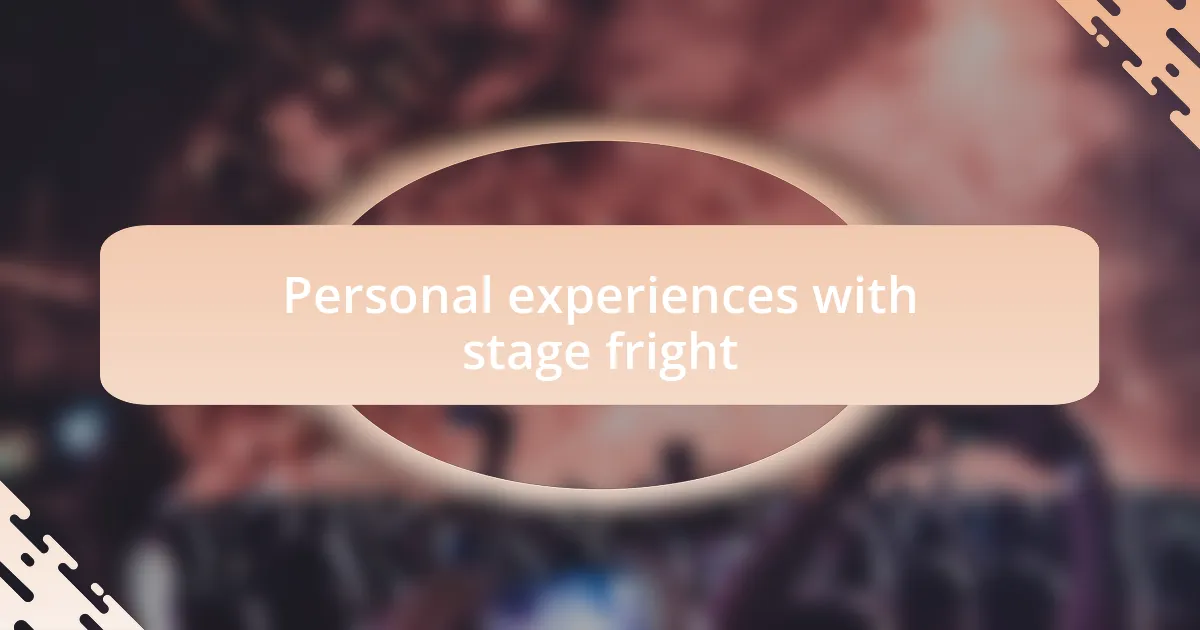
Personal experiences with stage fright
When I first stepped on stage, the feeling was like a storm brewing inside me. My palms were sweaty, and my voice felt trapped in my throat. I remember looking out at the audience and wondering if they could see how terrified I was, amplifying my fear even more. Did they feel my hesitation? That moment made me realize that stage fright was something I had to confront head-on.
There was one particular performance that sticks in my memory. The moment I began to play, I was so consumed by fear that my guitar felt like a foreign object in my hands. I could see a few familiar faces in the crowd, and instead of feeling comforted, I started doubting my abilities. I thought, “What if I let them down?” But just as I was about to spiral, I focused on that one friend who always cheered me on, and it helped me push through. I learned that tapping into my support network was a crucial technique for overcoming that initial wave of anxiety.
Reflecting on those early days, I often laugh at how stage fright seemed insurmountable. With every performance, however, I noticed something shifting. Instead of dreading the stage, I began to look forward to the thrill of connecting with the audience. How incredible is it that fear can transform into exhilaration? That shift in perspective was key for me, turning each performance into an opportunity rather than a source of dread.
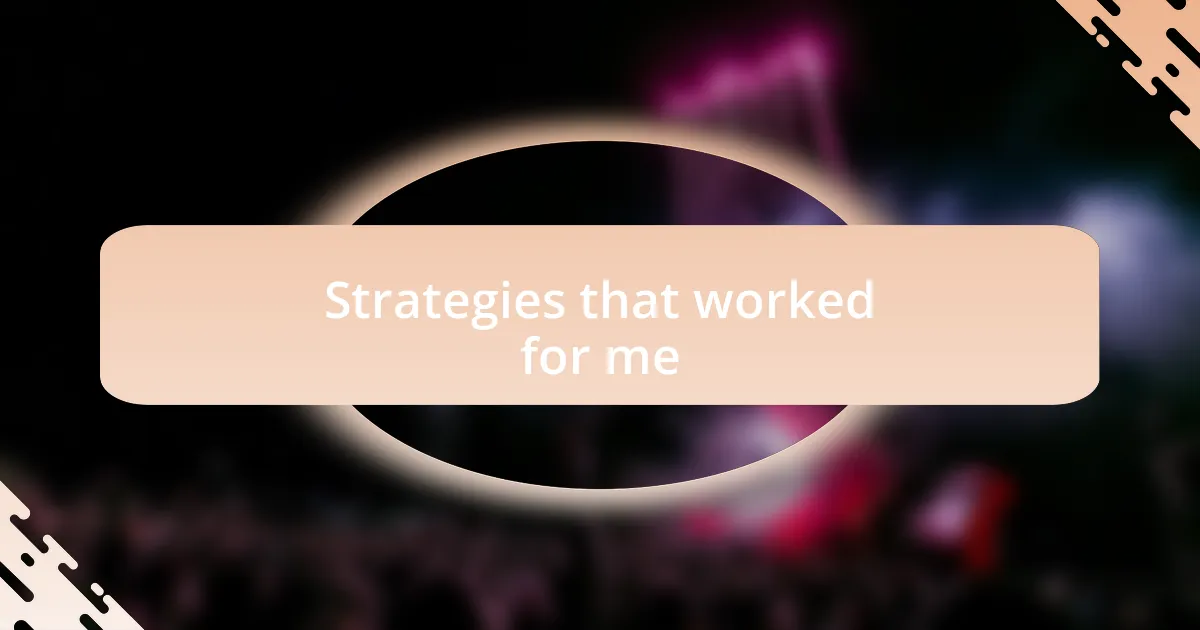
Strategies that worked for me
When I felt the familiar pang of stage fright creeping in, I discovered that visualization could be a powerful ally. Before a performance, I would close my eyes and imagine myself on stage, imagining every detail: the lights, the sound of the audience, and the joy of performing. It was as if I was rehearsing my success in my mind. Did this sound odd at first? Absolutely! But believe me, it worked wonders in boosting my confidence.
Breathing techniques became another essential part of my preparation. I remember standing backstage, heart racing, and I took a deep breath in, held it for a few seconds, then let it out slowly. This simple act grounded me, making my anxiety feel more manageable. Sometimes, I’d even count my breaths, focusing on each one to create a sense of calm. It might seem trivial, but those moments of deep breathing transformed my nerves into a steadier rhythm.
In the heat of performance, I learned to embrace the imperfections. One night, I hit a wrong note during a solo, and instead of panicking, I laughed it off and turned it into a playful moment with the audience. I thought, “Why shouldn’t I enjoy my own performance?” This shift in mindset helped erase the fear of making mistakes, allowing me to truly engage with the crowd. It made me realize that authenticity often resonates more deeply than perfection ever could.
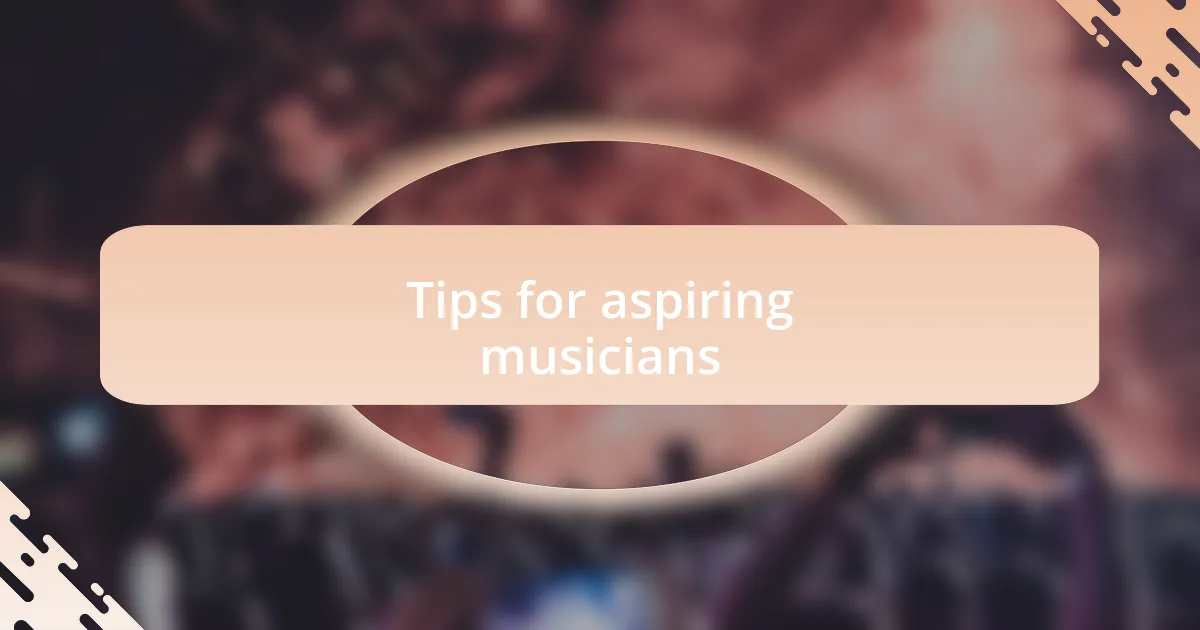
Tips for aspiring musicians
When diving into the world of performance, I can’t stress enough the value of practice. I recall a time when I committed to rehearsing not just my songs, but also the moments leading up to my performances. I would simulate the stage setup in my living room, complete with lighting and even an imaginary audience. This repetitive exposure helped me become desensitized to the nerves that often flooded me, and I found myself more relaxed each time I stepped onto the real stage.
Additionally, connecting with fellow musicians made a huge difference for me. I joined a local jam session group where we could exchange tips and experiences. The camaraderie we built created a safe space to share our fears and triumphs. Have you ever found solace in a community that understands your struggles? I did, and through that support, I learned that vulnerability can actually bring strength, which has been invaluable in overcoming stage fright.
Finally, I learned to focus on the audience rather than myself. During one performance, I locked eyes with a young fan who seemed genuinely moved by the music. In that moment, my fear dissipated; I realized it wasn’t about me at all, but rather the connection we were creating together. I often ask myself now, “Why let fear ruin that?” Shifting my perspective from self-doubt to shared experience transformed how I approached each show.
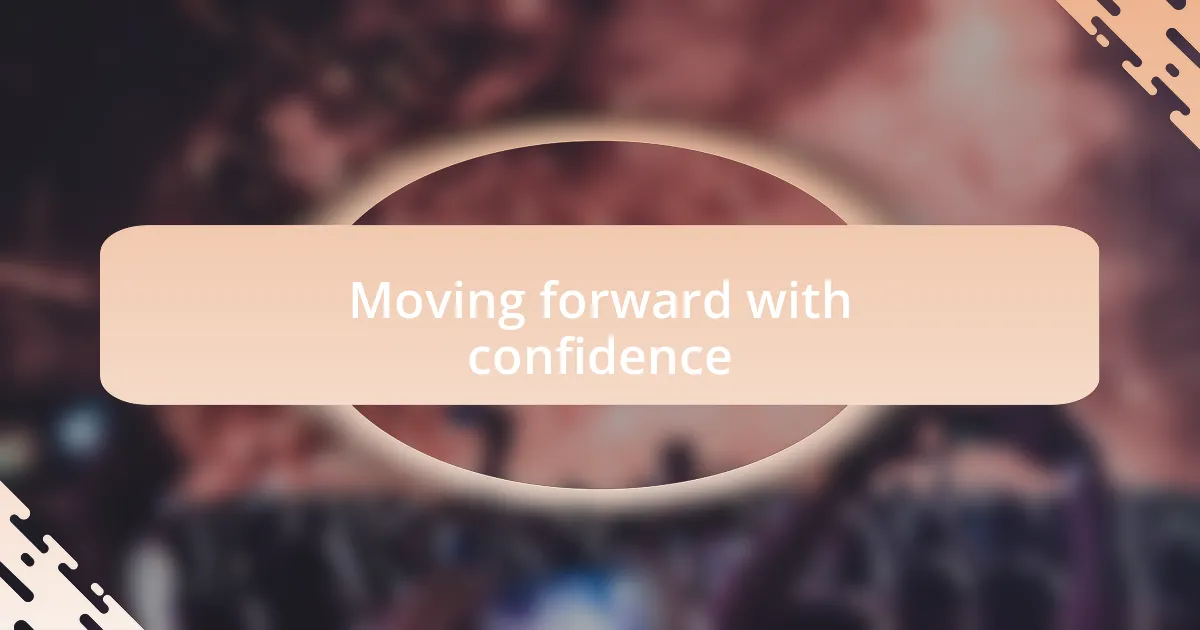
Moving forward with confidence
Moving forward, I learned that confidence isn’t something you’re born with; it’s a skill you develop over time. I remember the first time I stepped onto a stage after working through my stage fright. Heart pounding, I took a deep breath, and as I opened the show with my first chord, I felt a wave of calm wash over me. That initial moment taught me that taking that leap, even when scared, could lead to something truly magical.
I started to embrace small victories after each performance. For instance, I celebrated every time I connected with just one person in the crowd. It made me realize that each small success built a foundation of confidence. Have you ever felt that thrill of accomplishment? Those little moments encouraged me to look forward to performing rather than dread it.
As I continued my journey, I found that the key to moving forward with confidence was to keep challenging myself—whether it was trying out a new gig in a different venue or experimenting with a new song. Each challenge, while daunting, became a stepping stone. I always remind myself that discomfort often precedes growth. And isn’t that what we all want as artists? In taking these risks, I discovered a newfound empowerment that transformed my relationship with performance.